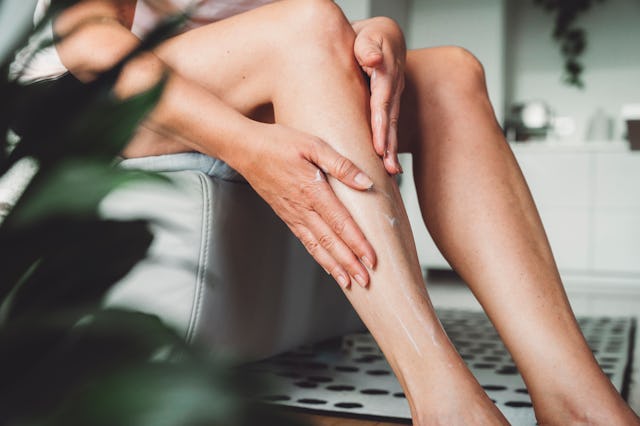Why Are My Legs So Itchy All The Time?
Dermatologists explain how to actually help your lotion make a difference.

You slather on your lotion every night, yet every morning you wake up with your legs still itchy and dry. What is going on here? Lotion used to be enough, so why are my legs so itchy all the time now? If you’ve found yourself applying lotions, oils, and body butters to no avail, you’re not alone. It turns out that the skin on your legs is prone to becoming drier with age, according to dermatologists, and there are a lot of things you might be doing to contribute to their dryness without even realizing it. Whether or not you’re willing to give them up (steaming hot showers are the best) is up to you.
Why are my legs so itchy?
For starters, if you have super itchy legs, know that it is very likely your skin is just dry. “The most common cause of itchy skin on the legs is going to be simply due to dry skin. So if your legs are itchy and the skin looks dry and flaky, you can feel pretty comfortable that is the cause,” says Brooke Jeffy, M.D., a board-certified dermatologist in Scottsdale, Arizona, and founder of youth skincare brand BTWN.
“Shaving your legs or trying new products may possibly lead to allergic reactions,” says Dr. Noah Gratch, a board-certified dermatologist at MDCS Dermatology in Manhattan. “Sometimes, the razor blades of shaving tools may irritate the skin, causing ingrown hairs, which will lead to sensitive and itchy skin. Contact allergies can also cause itchiness across the body.”
But what about common skin conditions that cause itching? “Skin itchiness on legs can also be attributed to some chronic conditions, including eczema and psoriasis. Eczema is a chronic skin condition that presents as red, itchy, and irritated patches of skin. Psoriasis is an immune-related disorder where plaques appear on parts of the body,” Gratch adds. He does point out that eczema tends to mostly affect children, and psoriasis usually develops in early adulthood, so it’s likely you would already know if you have one of these conditions.
Our circulation gets worse as we age, Jeffy adds, and one side effect of impaired circulation is drier skin on your lower extremities. So, even if nothing else about your routine has changed, it could just be that aging has changed your skin’s needs.
How to get your legs to stop itching
If lotioning up before bed every night just isn’t cutting it, here are some lifestyle changes you can make that Gratch and Jeffy say should help:
- Drink lots of water to hydrate skin from within.
- When choosing moisturizers and body washes, which can be drying or irritating to the skin, go for fragrance-free.
- Apply your moisturizer on damp skin once or twice a day. “So, apply lotion immediately after the shower or spritz water on the skin to prep [it first],” Jeffy says.
- Take shorter, cooler showers. Super hot water is drying.
- Sleep with a humidifier in your room.
- Add omega-3 and collagen supplements to your diet.
- Wear looser clothing, avoiding wool and polyester when possible, as both can irritate dry, sensitive skin.
If you are doing your best to hydrate the skin and things are not improving, or your scratching is severe and waking you up from sleep, Jeffy recommends scheduling an appointment with your doctor. Certain medications can cause itchy legs, as can diabetes or issues with the thyroid.